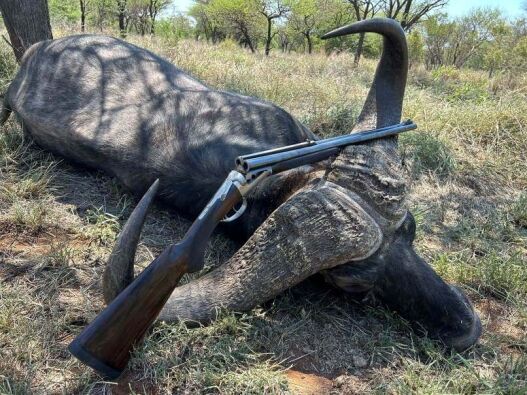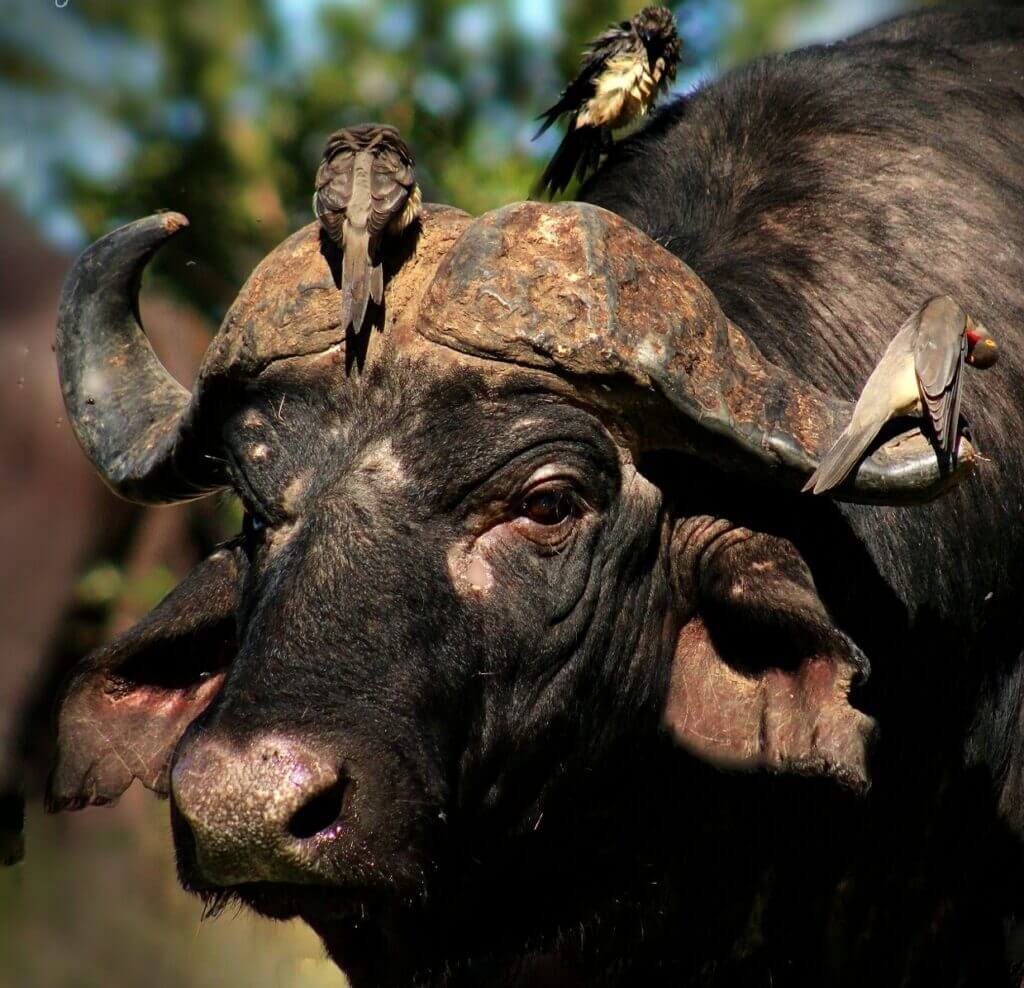
Zimbabwe is a magnificent country well worth a visit with prolific wildlife living in its natural habitat. Hunting and killing a buffalo requires skill, stamina, and stealth. The buffalo is aggressive and unpredictable and is considered one of the most dangerous animals to hunt. A wounded buffalo is a hunter’s worst nightmare, as he will charge his aggressor, often with fatal consequences. Achieving a successful buffalo hunt would be a great accomplishment for any hunter.
Your firearm (unless you’ll be hiring one in Zimbabwe). While you will not be required to provide proof of competency for buffalo hunting, you will be expected to be proficient with the firearm you use. The appropriate caliber rifles for buffalo hunting are .375 H&H Magnum, 416 Rigby, and .458 Winchester Magnum.
Your hunting outfitter will almost certainly provide you with a comprehensive packing list, but here are some items in case they don’t. Durable clothing for the African bush, binoculars, camera, comfortable walking boots, a hat, insect repellent, and sunblock should also be on your packing list.
Ask your hunting outfitter to provide you with the Zimbabwe Hunting Laws and Regulations and familiarise yourself with them.
You’d be well advised to take a dangerous game hunting course or practice at a shooting range that simulates real hunting conditions.
Hunts typically start with a pre-hunt briefing, where your professional hunter will run through the safety protocols, hunting strategies, and expectations. This will allow you to display your knowledge and ask questions.
Some shooting practice is likely to be the order of the day before starting the hunt to familiarise yourself with your weapon and ensure that all is present and in working order.
Buffalo hunting in Zimbabwe is physically demanding, often requiring you to walk long distances and be ready for action or retreat, over varied terrain. Make sure you are suitably fit and up for the challenge.
Your hunt will typically start early in the morning, after a light breakfast, and you’ll set off with your professional hunter, a tracker, and perhaps a game guide. Hopefully, it won’t be long before your tracker picks up the spoor and you’ll be on the hunt.
Remember to pay careful attention to your PH’s instructions regarding safety. Maintain awareness of your surroundings. Practice ethical hunting by following fair chase principles, ensuring quick and humane kills, and respecting wildlife and the environment.
Zimbabwe offers large and stable buffalo populations, which results in high hunting success rates. The buffalo are mainly in Hwange National Park, Gonarezhou National Park, and the Save Valley Conservancy. The hunts are challenging in varied and rugged landscapes.
Buffalo hunting in Zimbabwe is well-regulated with strict quotas and permits, and it is a legal requirement that hunters must hunt with professional hunters and licensed outfitters. Game Hunting Safaris will link you with an outfitter that will suit your requirements. Hunting-generated revenue supports conservation projects and anti-poaching activities.
Botswana has good buffalo populations, mainly in the Chobe National Park and Okavango Delta. The habitat consists largely of wetland and riverines which provide lush grazing areas. Hunting in Botswana was banned from 2014 to 2019 and is strictly controlled to ensure sustainability.
Hunting fees and permits support conservation and community initiatives with a strong focus on ecotourism and managing human-wildlife conflicts.
Namibia has smaller buffalo populations than the other countries, and most of these are found in the Caprivi Strip, which includes floodplains and riverine forests thus providing good grazing. However, due to the smaller populations, there are limited hunting successes.
The inevitable hunting licenses and permits apply, and hunting in Namibia is successfully managed through community conservancies. Revenue from the licenses and permits supports conservation and community projects.
In Mozambique, the buffalo populations are recovering following the devastating civil war that raged from 1977 to 1992, when wildlife was decimated as the warring factions relied on bushmeat for survival. Poaching continued unabated for some time after the war. However, thanks to effective conservation and anti-poaching efforts, the buffalo populations are now showing signs of recovery and are mainly found in the Niassa Reserve and Coutadas (hunting concessions). The habitat is diverse, including forests, savannahs, and floodplains. The revenue generated from the necessary hunting permits and licenses helps rehabilitate wildlife areas and supports ongoing anti-poaching efforts. The community is involved with conservation and benefits from the fruits of effective conservation and hunting.
Zimbabweans are possibly the friendliest and most hospitable in the world! This beautiful country has varied landscapes from savannah grasslands to the geological wonder of the Matopos National Park rock formations, and the densely forested Eastern Highlands. Zimbabwe is home to one of the Seven Wonders of the World, the magnificent Victoria Falls. An extended visit to encompass more of Zimbabwe is highly recommended.
When you speak to the Zimbabwean locals, be sure to engage in some small talk first – ask them how they are, and how their family is, before getting down to business. And please support the artistic vendors – they make and sell beautiful items such as carvings, batiked table linen, pottery, and jewellery.
Visit Zimbabwe once, and you’re sure to visit at least twice.
Buffalo hunting in Zimbabwe appeals due to the challenge, skill required, and the thrill of hunting one of the most dangerous animals in its natural habitat.
Pack a suitable firearm, durable clothing, binoculars, camera, comfortable boots, a hat, insect repellent, sunblock, and familiarize yourself with Zimbabwe Hunting Laws and Regulations.
Zimbabwe has large, stable buffalo populations with high success rates and well-regulated hunts. Botswana offers lush habitats and strong conservation focus, Namibia has smaller populations and community-managed hunts, and Mozambique is recovering with effective conservation efforts.
Hunters need a licensed outfitter, a hunting license from ZPWMA, a CITES permit for exporting trophies, a Zimbabwe visa, and potentially an import permit depending on the home country.
Expect a pre-hunt briefing, shooting practice, physically demanding hunts, early morning starts, and adherence to safety and ethical hunting principles.
Zimbabweans are friendly and hospitable, the country boasts varied landscapes, and it’s recommended to extend your visit to explore more, including the magnificent Victoria Falls. Engage in small talk with locals and support local artisans.

Search from our range of Hunts across various popular destinations in Africa.
Find A Hunt